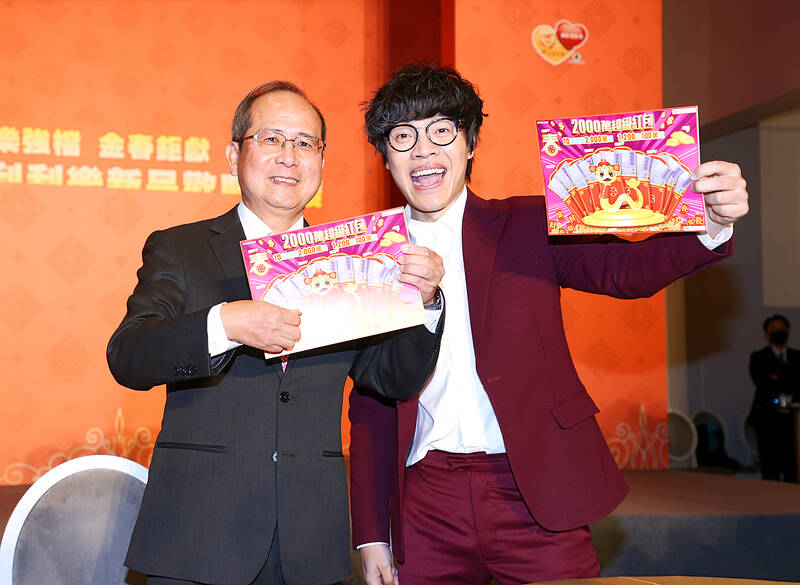Taiwan Lottery Co on Friday unveiled its annual Super Red Envelope (2,000萬超級紅包), the most popular Lunar New Year scratch card, which has NT$20 million (US$607,589) prizes, the highest amount of any scratch card.
Taiwan Lottery president Hsieh Chih-hung (謝志宏) said that the Super Red Envelope cards, marking the Year of the Snake, are to be sold for NT$2,000 each.
There are 10 top prizes, the most in the lottery’s history, he said.

Photo: CNA
In addition to the NT$20 million prizes, scratch card buyers would also have a chance to win one of 1,200 NT$1 million prizes, the second prize, Hsieh said.
Accompanied by pop singer Crowd Lu (盧廣仲), who is to appear in TV ads promoting the Lunar New Year scratch cards, Hsieh said more than NT$17.2 billion was up for grabs from the Super Red Envelope cards.
In the past, the second prize was NT$2 million in cash plus a sport utility vehicle, but a survey found that people preferred receiving cash so Taiwan Lottery increased the number of cash prizes, Hsieh said.
Hsieh said 69.33 percent of participants would win something.
Taiwan Lottery said it has also introduced five other scratch cards for the Lunar New Year lottery, all of which went on sale on Friday even though the Year of the Snake does not begin until Jan. 29.
Hsieh said the Golden Snake Awards (金蛇獎) scratch cards would cost NT$500 each and offer 13 top prizes of NT$3 million. Every purchaser is guaranteed to win something.
Meanwhile, A Handful of Banknotes (鈔票一把抓) would cost NT$300 each and there are eight top prizes worth NT$3 million, with 37 percent of those who buy one winning something, Hsieh said.
The NT$200 New Year Market card would have six top prizes of NT$2 million and one-third of those who purchase one would win something, he said.
Hsieh said the prizes from the six card types are worth more than NT$23.8 billion in total — the highest ever.

The Executive Yuan yesterday approved a southwestern extension of the Sanying MRT Line from New Taipei to Bade District (八德) in Taoyuan, with a goal of starting construction by late 2026. The 4.03-kilometer extension, featuring three new stations, will run from the current terminus at Yingtao Fude Station (LB12) in New Taipei City to Dannan Station (LB14), where it will connect with Taoyuan’s Green Line, New Taipei City Metro Corp said in a statement. This extension will follow the completion of core Sanying Line, a 14.29-kilometer medium-capacity system linking Tucheng (土城), Sansia (三峽)

CARGO LOSS: About 50 containers at the stern of the ‘Ever Lunar’ cargo ship went overboard, prompting the temporary closure of the port and disrupting operations Evergreen Marine Corp, Taiwan’s largest container shipper, yesterday said that all crew members aboard the Ever Lunar (長月) were safe after dozens of containers fell overboard off the coast of Peru the previous day. The incident occurred at 9:40am on Friday as the Ever Lunar was anchored and waiting to enter the Port of Callao when it suddenly experienced severe rolling, Evergreen said in a statement. The rolling, which caused the containers to fall, might have been caused by factors including a tsunami triggered by an earthquake in Russia, poor winter sea conditions in South America or a sudden influx of waves,

The Ministry of Culture yesterday officially launched the “We TAIWAN” cultural program on Osaka’s Nakanoshima sandbank, with the program’s mascot receiving overwhelming popularity. The cultural program, which runs from Aug. 2 to 20, was designed to partner with and capitalize on the 2025 World Expo that is being held in Osaka, Japan, from April 13 to Oct. 13, the ministry said. On the first day of the cultural program, its mascot, a green creature named “a-We,” proved to be extremely popular, as its merch was immediately in high demand. Long lines formed yesterday for the opening

BE CAREFUL: The virus rarely causes severe illness or death, but newborns, older people and those with medical conditions are at risk of more severe illness As more than 7,000 cases of chikungunya fever have been reported in China’s Guangdong Province this year, including 2,892 new cases last week, the Centers for Disease Control (CDC) yesterday said it is monitoring the situation and considering raising the travel notice level, which might be announced today. The CDC issued a level 1 travel notice, or “watch,” for Guangdong Province on July 22, citing an outbreak in Foshan, a manufacturing hub in the south of the province, that was reported early last month. Between July 27 and Saturday, the province reported 2,892 new cases of chikungunya, reaching a total of 7,716